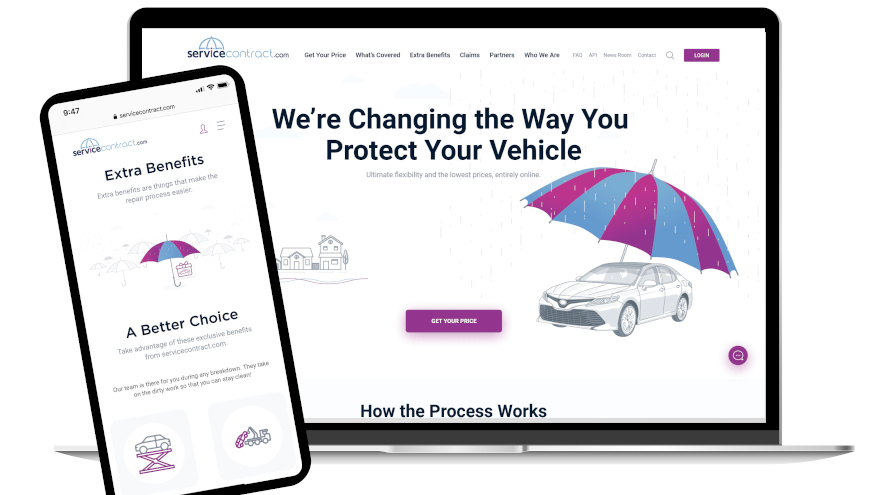DigniFi is looking to provide a financing option for dealership customers who might already be stretching their budget and then encounter a costly repair or other stumbling blocks to securing the necessary funds for vehicle delivery.
On Wednesday, the company expanded access to financial services for dealers with the launch of DigniFi ExpressWay, which includes a new revolving credit line and card that customers can use to make purchases in all five profit centers of the dealership, including F&I, sales, parts and accessories, service and collision.
ExpressWay can help dealers keep customers from walking away due to a lack of available funds. In addition, ExpressWay can offer access to special financing for up to six months on purchases of $350 or more.
And since terms are based on purchase amount, DigniFi pointed out that customers may be able to pay down their balances faster and incur less interest charges than with traditional credit cards.
“Our mission is to provide dealers with access to a point of sale financing solution so more of their customers can say ‘yes,’ to your dealer offers,” DigniFi chief executive officer Richard Counihan said in a news release. “We offer access to financing with flexible, affordable terms that drivers can feel good about. Our lender uses our advanced automotive analytics and instant online decision platform to provide the financing of thousands of car repairs, upgrades, accessories, and trade-ins every month. That's customers who no longer have to walk away from your dealership. Dealers pay a flat fee instead of a percentage of every loan.
Also, customers can use ExpressWay financing during multiple points in the vehicle sales process. Our service partners already enjoy revenue increases of up to 20% per year and we look forward to similar increases in sales and F&I,” Counihan added.
Frank Alvarez, operating partner at Premier Chrysler Dodge Jeep RAM of Buena Park, Calif., runs a busy franchised dealership that sells approximately 175 units per month and writes about 1,200 repair orders per month. The news release indicated Alvarez uses ExpressWay for both sales and service to help prevent customers from leaving due to a lack of funds.
The dealership just started using it in the sales department and is already enjoying an additional six to 10 new and used vehicle sales per month by having DigniFi ExpressWay available for their customers.
Service advisors and salespeople can share DigniFi point-of-sale materials with customers as well as text or email them a link to the DigniFi ExpressWay application. Customers can complete the application on almost any connected device. The customer needs a valid email address because all documents are signed electronically and emailed to the customer for their records.
“It is very simple for the customer to review the program information while they’re waiting for their vehicle estimate,” DigniFi said.
Customers receive a revolving credit line, as well as access to a cash advance feature whose proceeds can be used anywhere the customer chooses, even where the ExpressWay card is not accepted. Customers can receive a credit line up to $7,000. The minimum credit line is $350. They can use as much of their line as they like and since it’s a revolving line, they don’t have to reapply each time they use their account.
“DigniFi modernizes the vehicle sales and service process and our customers are thrilled that this option exists,” Alvarez said. “Frequently their only other option is a loan from their parents or aunt or uncle. Today it’s the Amazon world. If you want something you can get it the same day using Amazon Prime, and people are expecting that level of service from us.
“Our dealership wants to be forefront at instant gratification for our brands,” Alvarez said. “With the user-friendly DigniFi app we can send customers a link that allows them to share the details and discuss it with their relatives. It opens up a whole new avenue for them.
“We recently built a brand-new modern building with lightning-fast Wi-Fi, USB charging stations, high-end TV screens, you name it. ExpressWay is another fantastic technology option on the tail end of that which helps us beat out the competition,” Alvarez went on to say.
DigniFi added all loans are issued by WebBank, member FDIC.
For more information, visit www.dignifi.com/partners, call (855) 808-5861 or drop by booth No. 2893C at the 2020 NADA Show in Las Vegas on Feb. 15-17. To schedule a demo at NADA, go to this website.
The experts at ALG, Cox Automotive and Edmunds spotted a stable start to 2020 on the auto-finance front, with annual percentage rate (APR) for used vehicles remaining nearly steady and APR on new models moving higher but not dramatically.
Plus, incentives leveraged by automakers actually declined.
According to data from Edmunds, average APR on used vehicles financed in January came in at 8.3%, the same rate as November and just slightly higher than the December average of 8.2%.
Meanwhile, Edmunds found APR on new financed vehicles averaged 5.7% in January, compared to 5.4% in December and 5.5% in November. Edmunds data also revealed that the share of sales with 0% finance deals dropped to 3.6% in January, hitting their lowest level since April of 2019.
“January is a bit of a hangover month for auto sales given that it follows some of the biggest holiday blowout events at the end of the year,” said Jessica Caldwell, executive director of insights at Edmunds.
“Automakers typically rein in the incentives at this time of year, so it’s not unusual to see auto loan interest rates creep up. The good news is that interest rates are still much lower than they were a year ago,” Caldwell continued in a news release.
Edmunds data also showed that the average monthly payment, amount financed, and down payment for new vehicles softened month over month in January. On the used side, Edmunds noticed most of those financing metrics remained steady in January.
Edmunds experts attribute to a drop in purchases of luxury and larger vehicles.
“While December is all about flashier, bigger vehicle purchases, shoppers who make it to the dealership in January are mostly doing it out of necessity and, therefore, are a bit more pragmatic,” Caldwell said.
Cox Automotive elaborated about that sentiment, noting that January auto sales can be greatly influenced by two forces — harsh winter weather and excessive old inventory.
Analysts explained that extreme weather can impact vehicle sales in winter months as shopping dealership lots becomes more difficult for many parts of the country. However, this January did not experience massive snowstorms or cold across much of the country, unlike last year’s “Big Freeze” — a week of subzero temperatures which likely impacted last January’s vehicle sales, according to Cox Automotive.
Analysts added the other key ingredient is inventory levels, and how many old vehicle models remain after the holiday season sell-down incentive programs. Cox Automotive poited out that OEMs generally want only new model years to remain in the market at the start of the year; otherwise, pricing is more challenging, and large incentives may be required.
Cox Automotive data suggests inventory levels have improved in recent months, ending the year at their lowest levels since September 2015.
“Cold and cloudy weather mixed with a post-holiday shopping hangover usually results in little consumer interest and weak sales activity, Cox Automotive senior economist Charlie Chesbrough said.
Furthermore, ALG, a subsidiary of TrueCar, pointed out that automakers resisted the urge to slap a lot of cash on the hood to spark January sale.
ALG reported incentive spending as a percentage of average transaction prices (ATP) for the industry was expected to be 10.3% in January, down 3.2% from a year earlier and down 11.3% from December.
ALG also projected January ATPs to be up 2.0%, or $688, from a year earlier but down 1.6%, or $564, from December.
“In 2019, we saw sustained growth in average transaction price and despite a slight dip in sales for this month, we still expect an increase in January average transaction price year over year as consumers continue to opt for utilities and feature-rich vehicles,” ALG chief industry analyst Eric Lyman said in a news release.
New-Car Finance Data
|
|
January 2020
|
January 2019
|
January 2015
|
|
Term
|
69.5
|
69.2
|
67.2
|
|
Monthly Payment
|
$567
|
$551
|
$491
|
|
Amount Financed
|
$33,259
|
$31,707
|
$28,769
|
|
APR
|
5.7%
|
6.2%
|
4.5%
|
|
Down Payment
|
$4,375
|
$4,191
|
$3,542
|
Used-Car Finance Data
|
|
January 2020
|
January 2019
|
January 2015
|
|
Term
|
67.2
|
67.2
|
65.3
|
|
Monthly Payment
|
$407
|
$407
|
$367
|
|
Amount Financed
|
$22,082
|
$21,763
|
$19,874
|
|
APR
|
8.3%
|
8.9%
|
7.5%
|
|
Down Payment
|
$2,680
|
$2,614
|
$2,237
|
Source: Edmunds
Users such as Mastria Auto Group are enjoying the latest product from Darwin Automotive that became widely available for dealerships on Monday.
The company released Darwin Online’s Fastlane, which is designed to improve the vehicle purchase or lease process so consumers can go into the Darwin application using any smart device, build out their deal and share the deal structure with anyone in the world at the click of a button.
Vincent Mastria, marketing manager at Mastria Auto Group in Raynham, Mass., highlighted that Fastlane is what he envisioned for the future of digital retailing and his customers love it.
According to a news release, the tool produced Mastria favorite review of the year when one customer stated, “This dealership was really easy to work with and the best part of the process was the Fastlane software on their website. My deal was built out before even getting to the dealership which meant I didn’t have to be there for five hours negotiating and haggling. The team knew what I wanted and made it a seamless process. It’s like having the online flexibility of Carvana at your local dealership where you can and go see the car before you buy it.”
The news release mentioned another customer experience, saying, “Easiest experience at a dealership ever! I used their Fastlane option online, picked out my car, filled out all the info, chose the deal I wanted, uploaded pics of my trade and walked in to sign! So glad I did this!”
The company emphasized the Darwin Online process is geared to be swift and user-friendly. The shopper can go onto the dealer's website, select a vehicle and then click on “Create my Deal.” A short series of questions appear including how many miles per year the consumer will be driving, how long they plan to own the vehicle and credit score, and from there they can get a trade-in value or enter a manual trade-in value.
Next, the consumer is presented with five sets of options: an out the door price from a cash perspective; two financing options and two leasing options. They can either select to transact using one of the available options or customize it, such as by changing the down payment level.
Darwin noted its system then moves the customer onto aftermarket sales. Here they can select options such as maintenance, vehicle service contracts, tire & wheel — any of those value-add products for the customer. With Fastlane, at any point in the deal creation process, the consumer can share the deal with their significant other, a parent, or friend, anywhere in the world.
Then, all they have to do is go into the dealership, test drive the vehicle, sign the paperwork, and they can drive away in about 15 to 30 minutes.
“Our dealers and their customers are very excited about Fastlane,” Darwin Automotive chief executive officer Phillip Battista said. “One of the main objections dealers have to handle in the car buying process is that the buyer needs to check out the deal with someone else.
“Fastlane connects consumers seamlessly with anyone in the world. With just one click they can share the deal with their husband, wife, father, friend — you name it. They just point and click. This is the type of service today’s consumers demand for the purchase process and our dealers and their customers love the speed and simplicity of it,” Battista added
Darwin Automotive currently operates in all 50 states with more than 5,300 dealerships subscribed to its programs. Darwin delivered 504,000 deals on its platform in January and is on track to deliver 6.5 million units for the year.
For more information or to schedule a product demonstration, call (732) 781-9010 or visit darwinautomotive.com.
Cloud-based dealer management system provider DealerCenter finalized enhanced relationships with a subprime auto finance company and a provider of vehicle service contracts with the developments aimed at helping independent dealers.
According to separate news releases, DealerCenter now has improved connections with Nicholas Financial and GWC Warranty.
Officials explained DealerCenter’s users now have one-click access to GWC’s F&I products within their existing sales workflow, eliminating the hassle of navigating separate systems for rates and approvals.
“As one of the top-rated dealer management system platforms, DealerCenter’s mission is to provide outstanding service and functionality to our customers,” said Barry Lane, vice president of business development with DealerCenter. “Partnering with GWC, one of the top vehicle service providers in the nation, allows us another opportunity to do just that.”
Since 2002, DealerCenter has been committed to improving a dealer’s ability to manage their business, control costs and maximize profits with technology solutions designed to improve the vehicle-buying process. This strategic partnership can allow independent dealers to streamline the customer experience, delivering a more efficient and transparent way to write service contracts by processing loan originations and back-end products all in one place.
“At GWC, our goal is to help dealers drive results from their used car operation. Integrating with DealerCenter means our dealers can make faster decisions and close more deals in less time,” said Wendy Pratt, area vice president of strategic alliances with GWC.
“This partnership is another milestone in our mission to deliver a best-in-class experience,” Pratt continued. “The level of efficiency that this integration brings to the purchase process means our dealers can offer their customers the right F&I products upfront and push transactions through more quickly, cutting down on vehicle delivery time. Everybody wins.”
Nicholas Financial sees victories ahead for independent dealerships now that the branch-based subprime auto finance company is a preferred lender on DealerCenter.
As a preferred lender on the platform, Nicholas Financial highlighted that it will be able to help independent dealers get more deals approved and funded with a click of a button.
“We listen very closely to our customers’ suggestions, and they have been asking for an additional integrated lender to be added to our preferred lender platform,” Lane said. “Nicholas Financial is the perfect complement to our existing sources.”
DealerCenter also emphasized this new partnership connects independent dealers with a subprime, local branch-based finance company to streamline the buying process, allowing dealers to sell more vehicles to more customers.
“Nicholas has been focused on partnering with and servicing the local independent dealer since our inception in 1985. For 35 years, we have prided ourselves on being the independent dealer’s local lending partner. This partnership with DealerCenter allows the company to help more dealers more quickly than ever before,” Nicholas Financial director of operations Grant Martin said.
“Our partnership with DealerCenter is just one more example of how Nicholas is leveraging technology with common sense lending and good old-fashioned customer service in our journey to remain an industry leader,” Martin went on to say.
For more information on GWC, go to www.GWCwarranty.com. For more information on Nicholas, visit www.NicholasFinancial.com. For more information on DealerCenter, go by www.dealercenter.com.
Arista Financial Corp. already had a division focused on financing in the trucking industry. On Monday, the company added a new executive who will be leading the charge for its newest subsidiary aimed at helping individuals who need vehicles to be employed in ridesharing and related industries but cannot secure the needed financial means through other sources.
Arista appointed William Caragol as its new chief financial officer. The company highlighted Caragol has extensive experience with growth stage microcap companies in finance, mergers and acquisitions, business development and accounting.
The company announced last October that it intended to enter the mobility industry through a newly created majority owned subsidiary, Arista Mobility Group (AMG). With the addition of Caragol, Arista said on Monday it now will move forward with the formal incorporation of this entity in anticipation of commencing its activities in the mobility industry.
The company mentioned that it expects to provide further details regarding its plans for the mobility industry “soon.”
The company said it has evaluated the carsharing market, which has been estimated to grow to $12 billion by 2024, according to Global Market Insights.
Arista added that it determined that the expertise and experience of the AMG management group combined with the company’s experience in the transportation industry, provides an outstanding opportunity for growth in 2020 and beyond.
Arista reiterated that it currently operates in the transportation industry through its wholly owned subsidiary, Arista Capital, which provides trucks mostly to owner-operators that would otherwise be unable to obtain these vehicles. The company said it sees a similar opportunity through AMG to provide vehicles on a rental basis to drivers for ridesharing and delivery companies such as Uber, Lyft and Door Dash, who otherwise are unable to obtain these vehicles through other sources.
Now the company believes it has the leader in place to generate its growth.
“Bill Caragol is an excellent addition to the Arista team as he brings a wealth of financial knowledge and public company experience to this role,” Arista Financial chief executive officer Paul Patrizio said in a news release.
“I am very confident that this tremendous addition to the executive management team will accelerate our move into the next chapter of the Company’s growth,” Patrizio continued.
A nonprofit auto-finance organization launched in Dallas in 2013 and certified by the federal government received quite an injection of funding this week from Goldman Sachs.
On the Road Lending announced on Tuesday that it received a loan of up to $10 million from the Goldman Sachs Urban Investment Group to fuel expansion of its successful initiative across underserved communities throughout the Southeastern U.S. On the Road Lending explained that it helps clients improve their credit and purchase fuel-efficient, reliable vehicle with low-interest loans through its sister loan fund, which is a Community Development Financial Institution certified by the U.S. Department of the Treasury.
“Ultimately On the Road Lending fuels economic mobility and long-term success by providing the engine that drives people’s dreams,” On the Road Lending founder and chief executive officer Michelle Corson said in a news release.
“We’re grateful to have Goldman Sachs recognize through its investment that a car loan through On the Road Lending is life-changing because owning a reliable car increases job opportunities by removing transportation barriers,” Corson continued. “It also improves quality of life through better access to health care, education, and even healthier food choices.”
Since 2001, officials indicated the Goldman Sachs Urban Investment Group has committed $7 billion to underserved American communities. Margaret Anadu, head of the Goldman Sachs Urban Investment Group, elaborated as to why the firm made this commitment to On the Road Lending.
“Access to transportation is crucially important for accessing quality jobs, affordable healthcare providers, and fresh food, all of which are fundamental in bringing more opportunity to underserved areas,” Anadu said.
“We are excited to provide financing to expand the important work On the Road Lending is doing through the Southeast to remove barriers to owning a car and spark economic empowerment,” she went on to say.
As your finance company’s underwriting department receives applications from your dealership network, there’s a notable possibility the person looking to acquire a vehicle also is carrying a fair amount of student loan debt.
According to a recent estimate from the American Bankruptcy Institute (ABI), nearly 18% of American adults have student loan debt, collectively owing a staggering $1.5 trillion. And a recent survey orchestrated by LendEDU showed what kind of things these borrowers would give up in order to have their student loan debt completely forgiven — perhaps making them more favorable for auto financing.
The LendEDU report indicated 62% of student loan borrowers would give up their 2020 vote if it meant their student loan debt was completely forgiven, while 68% would give up social media for five years.
Some other findings of note included:
• Thirty percent would enlist to fight in a hypothetical World War 3 if it meant their student loan debt was completely forgiven
• Sixty percent would give up all streaming services for life
• Fifty-two percent would give up all payment methods besides cash for life
• Forty-nine percent would give up being vegan or have to become vegan for life
• Only 17% would give up hot showers for the next 25 years, the lowest percentage in the report
While not mentioning these particular options, ABI consultant Ed Flynn acknowledged a number of proposals have been advanced to address the issue of student-loan debt, which can be a trigger of pushing individuals into the non-prime and subprime spaces of auto financing.
“Student loan debt is a problem that is not going to go away on its own,” Flynn said in a press release highlighting a research article in the December ABI Journal that takes a closer look at the cost of those possible solutions.
Flynn previously worked for more than 30 years at the executive office for U.S. Trustees and the administrative office of the U.S. Courts.
Flynn added this thought, reflecting why some borrowers might be so apt to give up notable privileges in return for student-loan forgiveness, “Repayments each year barely cover interest and penalties, and the balance owed rises inexorably.”
Another provider entered the F&I marketplace this year to connect with consumers who did not opt to secure a vehicle service contract (VSC) at the time of their new- or used-vehicle purchase.
Vincent Odoardi, managing partner of Bedford Chrysler Dodge Jeep Ram in Bedford Hills, N.Y., put it this way in a news release about Servicecontract.com, “Some customers don’t like to make an on-the-spot decision. There is definitely business there — in what we call the ‘after, after-sale.’”
Site officials explained their intuitive new website was designed for consumers, to help customers understand their options and empower them to select their own vehicle service contract coverage, putting them in control of the transaction.
In addition to offering simple, customizable coverage options, Servicecontract.com is integrated with an advanced rating engine that can deliver confidence that Servicecontract.com VSCs are fairly priced.
Furthermore, Servicecontract.com is rolling out what it called an “unprecedented stacks” program that can provide two reward plans to allow consumers to reclaim unused premium payments.
“Consumers want to select their own coverage, on their own time,” said Michael Wymard, co-founder of Servicecontract.com. “We know many consumers are tired of feeling as if they are forced to buy long-term or mileage-limited service contracts in order to ensure their vehicle repairs are covered."
On the other side of the transaction, dealers had no way to recapture the lost opportunities from customers leaving the dealership without purchasing F&I products. These are the reasons why we launched Servicecontract.com,” Wymard continued.
Odoardi is convinced this provider has its place in the competitive F&I space.
“It’s an untapped market,” Odoardi said. “There is definitely at least 10% more VSC business we are missing out on in a given month after the vehicle sale. We talk about following up with those customers, but F&I managers have too many demands on their time, and it just doesn’t get done.”
Unique benefits of Servicecontract.com VSCs include:
— No term or mileage restrictions
— Month-to-month subscription coverage
— The ability to cancel at any time directly within the consumer online portal.
Created to empower dealers by meeting the needs of consumers, Servicecontract.com also want to serve as an experienced post-sale VSC partner, by including dealership-branded websites and telemarketing support powered by data-mining technology with direct DMS integration. Dealers are provided with seamless branding at every consumer touchpoint, and can select between multiple participation models.
“Our goal was to revolutionize the F&I process,” Wymard said. “Servicecontract.com was created to improve the consumer experience by giving them control of their vehicle protection.
“Simultaneously, we help dealers provide added value to their customers in the post-sale arena, while providing seamless assistance to recapture some of that lost revenue,” he continued.
The vehicle service contract market as a whole represents a $35 billion opportunity that is still growing, according to Colonnade Advisors’ Vehicle Service Contract Industry Market Commentary. And although the post-sale channel is currently the smallest of the four primary VSC sales channels, it currently represents $2.4 billion in annual sales.
Wymard insisted this market segment continues to grow as it is continuously replenished when factory warranties expire.
“Today’s drivers are predominantly digital natives, and prefer to shop online,” Wymard said. “If dealers want to reach them after they drive off the lot, they have to make the F&I experience easy and accessible at all hours, wherever they are most comfortable.
Servicecontract.com was created to be that virtual VSC partner for dealers to reach their customers post-sale,” he went on to say.
Veros Credit attributed two specific performance metrics and critical enhancements that pushed the subprime auto finance company to a record-breaking year in 2019 and boosted dealer satisfaction to an all-time high.
According to a news release sent to SubPrime Auto Finance News this week, Veros Credit captured a 20% increase in contract origination year-over-year, while cutting dealer funding time by 50%.
“We made the process as seamless and as painless as possible for our partnered dealers so that they can expect a positive, fair and efficient outcome every time,” Veros Credit chief operating officer Harvey Singh said in the news release.
“Experience and feedback taught us what our dealers needed, and we simply invested intelligently to meet the demand,” Singh continued
Singh went on to emphasize that technological innovation and implementation are just a part of the business strategy at Veros Credit. He noted that maintaining positive and mutually beneficial relationships with dealers remains paramount, too.
“We do not just deliver technology to the doorstep of our partnered dealers; rather, we show them how to use it to better their business,” Singh said.
Veros Credit highlighted that this strategy has enabled the finance company to enter six new markets in 2019, helping to fuel that 20% growth over 2018.
The company believes it can exceed that accomplishment with additional territories that are expected to open in 2020. Veros Credit said the new markets will include the roll-out of new programs for both independent and franchised dealers.
The company added that the Veros Credit Franchise Dealer Program was another enhancement of 2019 that will be a point of emphasis in the years to come. Veros Credit designed a model that can provide quick decisions with competitive rates while dovetailing complete dealer support throughout the program.
“It is a very exciting time to be a part of Veros Credit and the improvements we continue to make for both the dealer and customer experience will continue to drive growth that is scalable and sustainable,” Singh said.
While most used-vehicle financing metrics closed 2019 at a steady pace, Edmunds noticed the average interest rate for a new-vehicle retail installment contract fell for the third month in a row in December, dropping to its lowest point since February 2018.
Edmunds reported the annual percentage rate (APR) on new financed vehicles averaged 5.4% in December, compared to 5.5% in November and 5.9% in December of 2018.
Edmunds data showed that 22.4% of shoppers who financed their vehicle purchases in December 2019 got an interest rate below 3%, compared to 20.4% of those who financed purchases in December 2018.
“Automakers and dealers gave new-car buyers a lot of reasons to feel some holiday cheer in December,” Edmunds executive director of insights Jessica Caldwell said in a news release.
“Everyone knows new-car deals are usually sweetest at the end of the year, but it’s been a long time since financing offers were this good,” she continued.
Meanwhile on the used-vehicle side, Edmunds determined that while terms and monthly payments in December mirrored the figures seen a year earlier, average APR on used financing dipped to 8.2% while the total amount financed rose by more than $400 year-over-year to $22,660.
Although interest rates took a dip, Edmunds pointed out new-vehicle retail prices are expected to hit near-record highs in December.
Edmunds data indicated that the average transaction price for a new vehicle will climb to $38,377 in December, compared to $37,260 last year and $33,773 five years ago.
“The December numbers aren’t always indicative of larger market trends because people tend to buy pricey luxury vehicles, trucks and SUVs this time of year,” Caldwell said. “This drives up the average transaction price and lowers the average APR since these shoppers can usually qualify for the lowest promotional rates.
“But the fact that rates have been on a steady decline for the last several months bodes well for more favorable financing conditions in 2020,” she continued.
Two other firms weighed in on how new-vehicle prices behaved in December, beginning with Kelley Blue Book.
The valuation analysts at Kelley Blue Book reported the estimated average transaction price for a light vehicle in the United States was $38,948 in December. New-vehicle prices increased $656 (up 1.7%) from December of 2018, while falling $80 (down 0.2%) from November.
“New-vehicle transaction prices finished the year on a high note, with the average rising nearly 2% and approaching the record set in November 2019,” Kelley Blue Book analyst Tim Fleming said in a news release. “However, as retail demand fell in 2019, dealer discounts grew, approaching 7% of MSRP in December – the highest since July 2009.
“On a positive note, the discounts appear to be working as the average days in inventory fell by two days from the previous month,” Fleming continued. “With sales expected to be down in 2020, anticipate the pressure to continue on new-car prices and incentives.”
And over at ALG, a subsidiary of TrueCar, analysts there projected average transaction prices (ATP) to be up 2.4% or $836 from a year ago and up 0.5% or $174 from November.
“Average new-vehicle transaction price has increased in every single month of 2019 when compared with the same period a year ago,” said Oliver Strauss, chief economist at ALG, a subsidiary of TrueCar.
“Consumers have continually opted for higher-priced vehicles, including trucks and utilities, but also for luxury,” Strauss continued in a news release. “In this year’s slightly decreasing automotive market, we’re seeing luxury sales declining at a slower pace than mainstream sales.”
New-Car Finance Data
|
|
December 2019
|
December 2018
|
December 2014
|
|
Term
|
69.0
|
68.4
|
66.8
|
|
Monthly Payment
|
$577
|
$558
|
$499
|
|
Amount Financed
|
$33,865
|
$32,056
|
$29,162
|
|
APR
|
5.4
|
5.9
|
4.4
|
|
Down Payment
|
$4,498
|
$4,487
|
$3,687
|
|
Average Transaction Price
|
$38,377
|
$37,260
|
$33,773
|
Used-Car Finance Data
|
|
December 2019
|
December 2018
|
December 2014
|
|
Term
|
67.3
|
67.2
|
65.2
|
|
Monthly Payment
|
$416
|
$413
|
$371
|
|
Amount Financed
|
$22,660
|
$22,207
|
$20,132
|
|
APR
|
8.2
|
8.7
|
7.6
|
|
Down Payment
|
$2,722
|
$2,683
|
$2,278
|
Source: Edmunds












